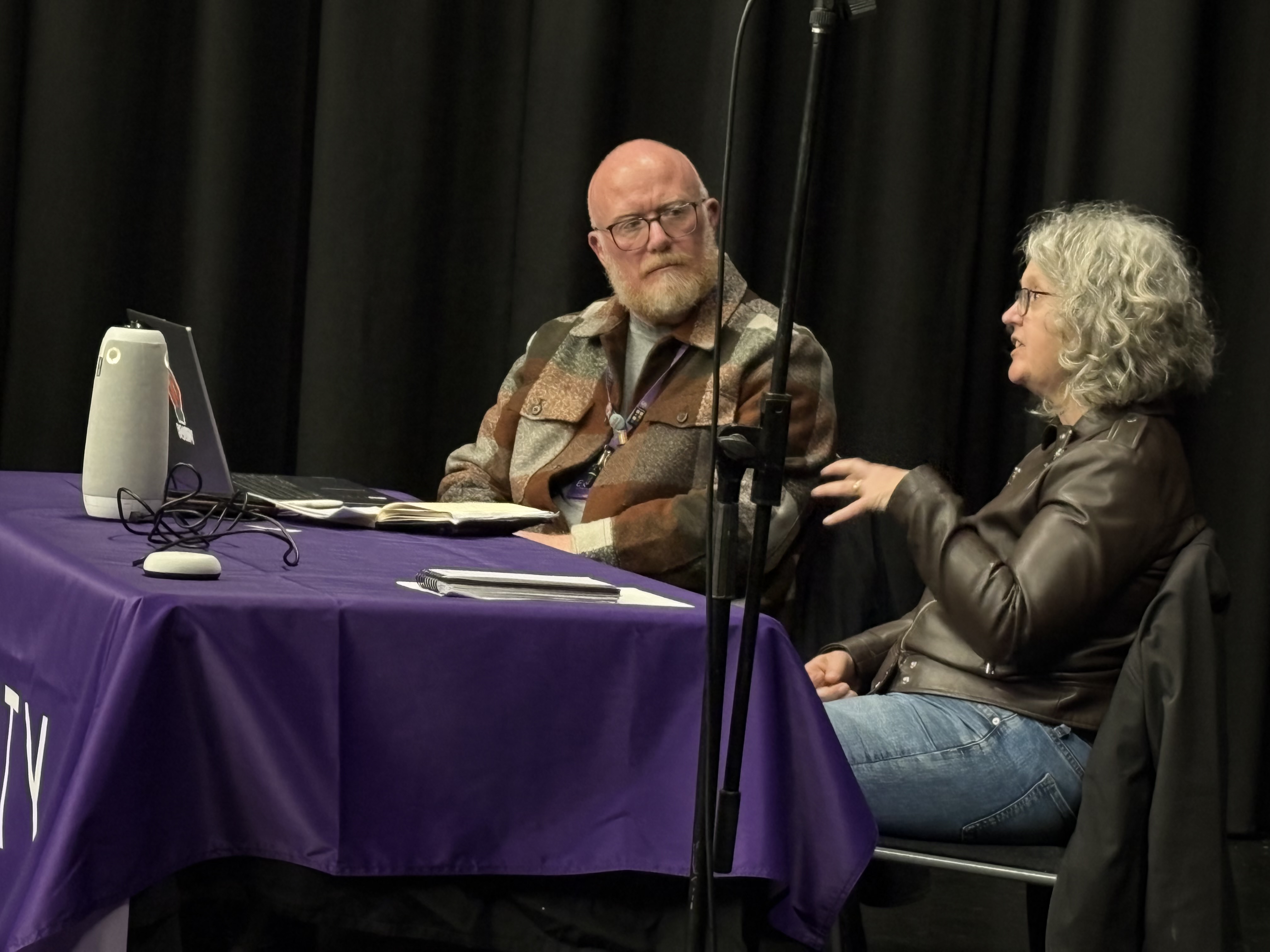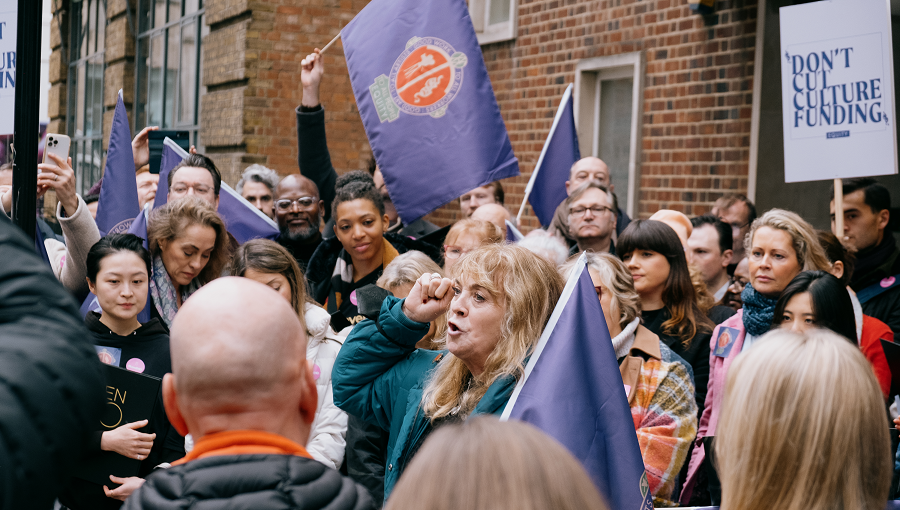International solidarity across the acting profession was on display in Birmingham last week as the International Federation of Actors’ Unions (FIA) came together for their global congress, with Equity UK the host union.
Delegates from 61 countries were present, all representing working actors and performers across theatre, film, tv, audio, dance, singing and other performance disciplines. The Congress is the first time in eight years that FIA Global has met in person, as the covid pandemic forced the last Congress online.
“International solidarity and the collective pursuit of protections and improvements for artists is more relevant than ever” explained Equity general secretary Paul W Fleming, who is also a Vice President of FIA. He continued: “So many of the challenges facing workers in the performing arts and entertainment industries are global – from AI to freedom of expression, investment, pay and conditions. This is a truly global workforce in an internationally connected industry, and so our trade union response to the challenges of our members must also be global in outlook and in practice.”
The themes of international solidarity, precarity of work and the challenges posed by AI and the far-right rang through the week’s events, as union after union brought the experiences of their members to the fore. Equity’s delegation of Paul W Fleming, Lynda Rooke, Nick Fletcher, David John, Elle Sutton, Dan Edge, Tonia Daley-Campbell, and Hywel Morgan spoke on a range of subjects, bringing the experience of Equity UK members to a global stage.
International solidarity
Speaking on a panel about international solidarity, SAG-AFTRA’s President Sean Astin said “it meant everything” to have the solidarity of other unions during their recent actors’ strike in America. “It was an affirmation of who we are as a people”, he enthused. Fellow panellist Marie Soubestre, from French union SFA, agreed, saying “international solidarity is key because it allows you to move forwards, to have greater impact.”
“Sometimes you need a strike to get to the collective bargaining. That’s where we come in as global union affiliates”, explained Johannes Studinger from Belgian union UNI MEI. He recounted the experience of supporting Greek unions in securing the reinstatement of the Greek public service broadcaster. “Our solidarity did not win the campaign, let’s be clear. But there was a moment in that campaign when it was very difficult, they felt low and we were there to give our solidarity and let them know they were not alone.”
This solidarity and unity of purpose was foregrounded by Dominick Luquer, FIA general secretary, who said “FIA thrives on solidarity” in his opening speech to Congress, continuing: “We are first and foremost a federation bound by one single purpose: that the performers we represent can live with dignity, with workers’ rights, in safe workplaces and without discrimination.”
AI makes an appearance
After four years since the last meeting of FIA Global Congress, it was starkly noted that AI had not even been on the agenda in 2021, yet in 2025 it was central. “AI has moved from a marginal topic to a defining challenge” explained Dominick Luquer.
In an industry which operates globally, AI technology knows no boundaries. Equity general secretary Paul W Fleming spoke of the protections that Equity is seeking to secure in TV and film contracts via PACT negotiations. He referenced recent success on a film where actors all stood together to ensure an AI rider was in place – uniting and refusing to be scanned on set until the producer agreed to their terms. Panellists from America, France, Spain, Denmark and Columbia talked about the radical changes that AI is bringing to work in the sector and how unions have mobilised to try and set some fair rules of the game, even as the parameters continue to change.
Challenging the far-right
Union speakers from America, Argentina, Germany, Sweden and Turkey took part in a panel session exploring the challenges raised by the far-right. During the debate, Equity Councillor Dan Edge asserted, “if you want to know the direction of your government, look at how they treat disabled people who they see as weak, workshy and unable to fight back.”
The debate centred on the challenges that far-right movements bring to the arts and trade unions. Fears for freedom of artistic expression, cuts to cultural spending or its weaponisation, as well as threats to trade unions and their defence of workers were all discussed. Equity Midlands Councillor Tonia Daley-Campbell warned delegates “we are sleepwalking into fascism”, citing the Unite the Kingdom rally in London on 13 September. She urged people to “speak up and speak out against racism and fascism –don’t fight racism with silence.”
Birmingham centre stage
During a packed week of events, Birmingham played host to FIA’s regional group conferences and a range of topical discussions, fringe and social events, in addition to Global Congress. Delegates were welcomed officially to the city by the West Midlands Mayor Richard Parker at a reception in the City Museum and Art Gallery. The mayor thanked the assembled artists and unions for the work they do and referenced the importance he places on shows such as Peaky Blinders being filmed in Birmingham. He recognised the welcome financial investment this brings and said, “it's important that your rights are protected and secured as workers, and it's also important that we stand up for workers’ rights in the face of rising populism and far right.”
Equity President Lynda Rooke gave official welcomes to delegates, nodding to Birmingham being the birthplace of Shakespeare, Ozzy Osbourne, and Equity general secretary Paul W Fleming. “Our best defence is to stand together, use our collective strength”, said Lynda.
And local boy Paul W Fleming lost no opportunity to tell delegates that Birmingham is the greatest city in the world. At the Congress gala dinner in Birmingham city council’s grand Council House, he spoke of Birmingham’s significance both historically and presently. “Birmingham is the heart of England, the birthplace of the industrial revolution and the city that built Britain” he said. “Birmingham is the city that brought you Cadbury chocolate, Birds custard and invented the Balti curry. It’s the home of Birmingham Rep – the first permanent theatre company in the UK, providing stable employment to artists. Birmingham is a multicultural city of workers which built Britain and celebrates culture alongside industrial innovation.”




